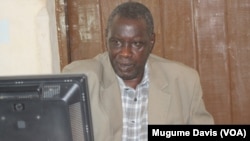A veteran South Sudanese journalist and editor said Monday he has been ordered by the National Security Service not to publish "opinions from outside" in his newspaper, the Juba Monitor.
Alfred Taban told South Sudan in Focus that the National Security Service (NSS) "...told us that we were taking a lot of opinions from outside and they wanted us to discourage some of these. We agreed, so many of the opinions from outside, we're not going to use them."
Juba is becoming very much like Khartoum because they have seized our newspaper several times and they have also asked us not to publish a number of times.
Asked to specify which opinions the NSS was trying to censor, Taban said, "What the rebels say."
"A few days ago we published several articles about the poisition papers of the rebels and the government was very unhappy about it," he said.
South Sudanese Information Minister Michael Makuei said in March and again last month that journalists who report the views of rebels led by former vice president Riek Machar are "rebels and agitators" and could face prosecution.
Two weeks ago, the South Sudanese military told reporters that all stories on security matters have to be cleared with the office of the SPLA spokesman before they are published.
The Juba Monitor and other newspapers have been seized on several occasions, radio stations have been shut down and at least a dozen reporters and editors have been taken in for questioning by the authorities in South Sudan since the country plunged into conflict in December last year.
Government denial
Presidential spokesman Ateny Wek Ateny denied that the NSS has ordered the Juba Monitor to self-censor its work. Instead, Ateny insisted, Taban and other editors were being "advised to observe the ethics of their operation, especially when the material they are publishing... is inciting hatred among the community."
The alleged order for the Juba Monitor to self-censor came weeks after President Salva Kiir signed three media bills into law. Journalists had hoped the new laws would strengthen their rights and give them easier access to information.
Ateny said that, under the country's recently signed media laws, publishing and broadcast groups can be taken to court for insulting President Kiir. The Juba Monitor has published articles which, Ateny said, have "insulted the president personally." He did not say if the government intended to take legal action.
More and more like Khartoum
Taban said the intensifying crackdown on the media in South Sudan is reminiscent of the many years he spent in Khartoum as managing editor of the English-language newspaper, the Khartoum Monitor.
"Juba is becoming very much like Khartoum because they have seized our newspaper several times and they have also asked us not to publish a number of times," he said.
Taban was detained several times when he published out of Khartoum, and the Khartoum Monitor's print-run was confiscated by the authorities there on numerous occasions.







